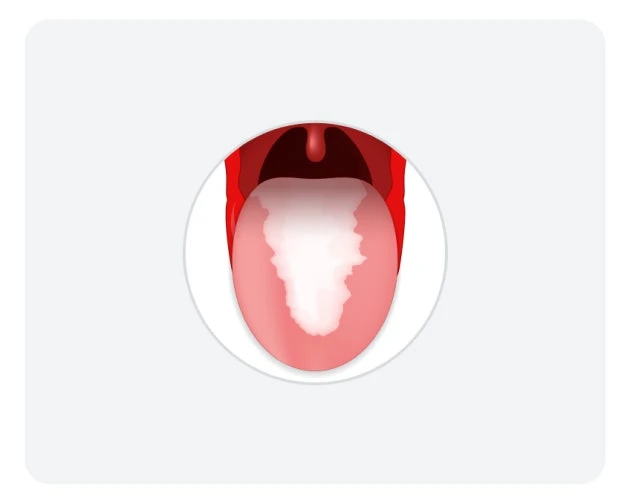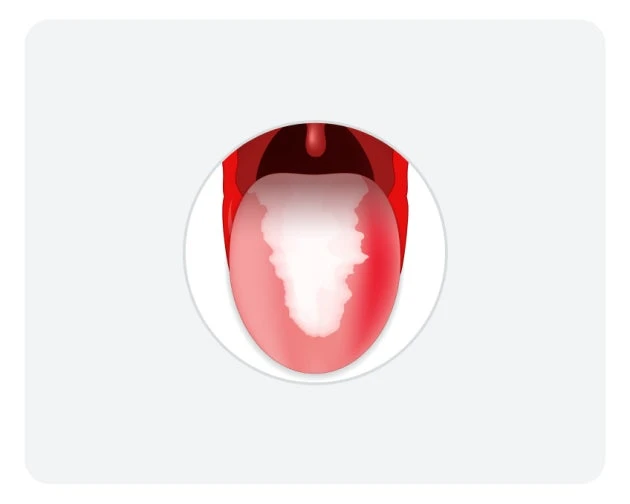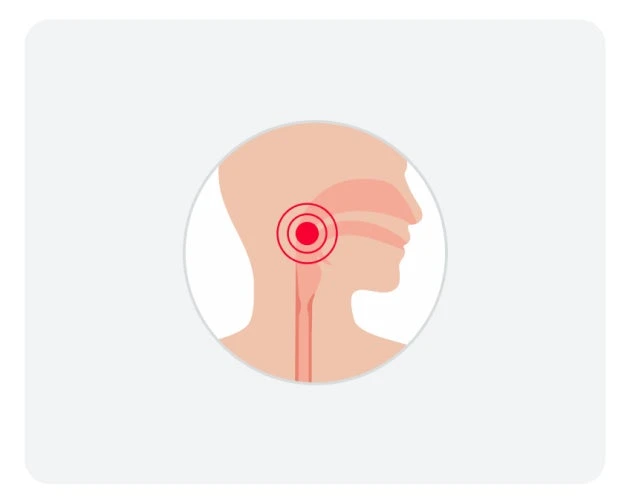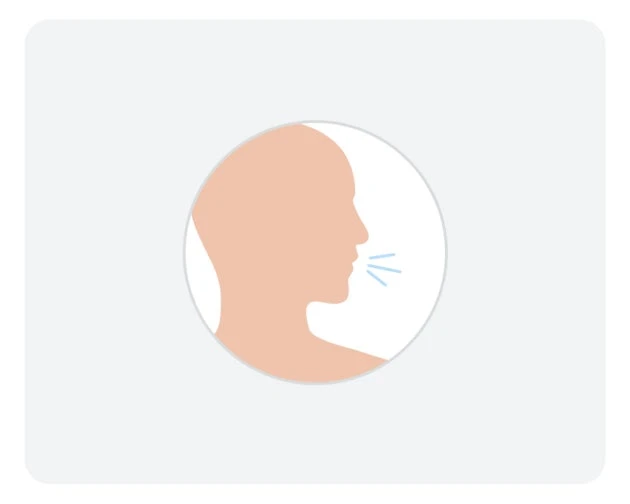Oral thrush (candidiasis)
Recognize the symptoms and prevention strategies to keep your mouth healthy
Experiencing oral thrush can be unsettling, with white lesions appearing on the tongue, inner cheeks, roof of the mouth, and throat. These unwelcome guests bring discomfort and can make you self-conscious. At Aspen Dental, we are committed to helping you understand oral thrush and providing effective strategies to manage and prevent it.
What is oral thrush?
Oral thrush, also known as oral candidiasis, is an oral bacterial infection caused by an overgrowth of the fungus Candida albicans in the mouth. While this fungus is normally present, certain factors can allow it to multiply out of control, leading to an uncomfortable infection.
What causes oral thrush?
Candida albicans, the fungus behind oral thrush, is an opportunistic organism that flourishes in the warm, moist environment of the mouth. When conditions are favorable due to factors like a compromised immune system or disruption of the oral microbiome, Candida can rapidly proliferate and cause infection. It's crucial to note that Candida is a fungus, not a bacteria, requiring antifungal treatment to regain control over an overgrowth.
Oral thrush symptoms
Oral thrush has distinctive symptoms, that compare to other bacterial infections that may occur in your mouth. These are characterized by:

White-coating of tongue
Presence of creamy white, slightly raised lesions that resemble cottage cheese

Discoloration and tenderness
Soreness and redness in the mouth and on the tongue

Difficulty swallowing
You may find it hard to swallow at times, with an accompanying sensation of stuck food

Throat sensitivity
A disturbance in voice or speech articulation due to lesions in the throat
Risks factors of oral thrush
Oral thrush is more common than you may think. This pesky and uncomfortable infection can manifest in infants, adults, and to the elderly. It commonly attacks those with weakened immune systems and has underlying causes such as:
A weakened immune system
Antibiotics & certain medical conditions
Dry mouth
An unhealthy diet
Ill-fitting dentures
Age
Smoking
Oral thrush treatment options

Professional medical treatments and antifungal medications
In the fight against oral thrush, healthcare professionals often prescribe antifungal medications that can be in the form of tablets, lozenges, or mouth rinses. These medications work to eliminate the fungus, bringing relief from symptoms.

Home remedies and natural approaches
Home remedies can provide supplementary relief, although their effectiveness varies. Rinsing the mouth with a warm saline solution, yogurt consumption for its probiotic elements, and the gentle utilization of a soft toothbrush are worth considering.
How to prevent oral thrush
Oral hygiene
Regular brushing, flossing, and dental check-ups can help maintain the balance of organisms in the mouth. Additionally, a tongue scraper may help keep extra bacteria off your tongue, which could aid in preventing oral thrush. If you have dry mouth, use saliva substitutes and probiotics to also maintain the pH balance.
Regular check-ups
It’s also a good idea to be consistent with your dental check-ups at your local Aspen Dental dentist office. They can provide advice, offer routine cleanings, and make sure your gums and teeth are in good condition.
Diet and healthy habits
Keeping sugar consumption in check and avoiding tobacco can inhibit the growth of candida. Additionally, maintaining a balanced diet can help support the immune system and prevent the onset of oral thrush.
Clarifying myths, what oral thrush is and isn’t
Despite its distinct appearance, oral thrush can sometimes be mistaken for other oral conditions, like leukoplakia or oral lichen planus. This confusion can result in mismanagement of symptoms or even self-misdiagnosis. It's crucial to distinguish oral thrush from these conditions to ensure proper treatment. Additionally, oral thrush is frequently misidentified as a bacterial infection, further complicating symptom management.
When to seek medical attention
Symptoms that last for more than two weeks demand medical attention. Additionally, individuals with a weakened immune system who develop the symptoms of oral thrush should not hesitate to consult a healthcare professional.
Oral thrush FAQs
What happens if oral thrush is left untreated?
If left untreated, oral thrush can spread to the esophagus, leading to a more invasive infection with symptoms such as difficulty swallowing, fever, and cough. This condition is referred to as esophageal candidiasis and requires immediate medical intervention.
Can oral thrush go away on its own?
Oral thrush might resolve on its own in very mild cases, particularly when the underlying cause of the imbalance is removed, such as reducing the use of antibiotics or improving denture hygiene. However, for most cases, especially those caused by an underlying health condition or in individuals with weakened immune systems, treatment is necessary to prevent the spread of the fungus and alleviate symptoms.
What is the fastest way to get rid of oral thrush?
To swiftly combat oral thrush, start with antifungal medications like nystatin or clotrimazole, available as lozenges, tablets, or liquids. Enhance oral hygiene by brushing twice daily and flossing, cleaning dentures thoroughly, and managing any contributing health issues such as diabetes to control blood sugar levels. Adjust your diet by reducing sugars and yeast-rich foods and including probiotics, address dry mouth with suitable products, and avoid irritating mouthwashes to restore microbial balance effectively.
What foods should be avoided with oral thrush?
Avoid sugary and yeasty foods, such as candy, cookies, breads and dairy products (with the exception of probiotic yogurt) which can promote fungal growth, as well as spicy and acidic foods that may irritate the mouth.
How long does oral thrush last?
Oral thrush, if left untreated, can progress to a chronic condition, persisting for an extended period beyond the typical 1 to 2 weeks. Chronic oral thrush may indicate underlying health issues such as weakened immune function, hormonal changes, or the presence of other medical conditions such as diabetes or HIV.
Explore our dental services and more
Protect your oral health to keep the joy in your smile
Ensuring consistent dental care and good oral hygiene practices at Aspen Dental can help keep oral thrush at bay.



